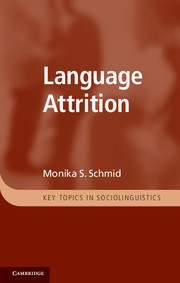Book contents
- Frontmatter
- Contents
- List of figures
- List of tables
- Preface
- Abbreviations
- 1 Introduction
- Part I Linguistic aspects of language attrition
- 2 What is attrition?
- 3 Cross-linguistic influence and the mental lexicon
- 4 Attrition in the mental lexicon
- 5 Attrition and the structure of language
- Part II Extralinguistic aspects of language attrition
- Part III Conducting research on language attrition – preliminary considerations
- Part IV Experimental designs for attrition research – the language attrition test battery
- Part V Coding and analysing the data
- 18 Conclusion
- Glossary
- Notes
- References
- Index
3 - Cross-linguistic influence and the mental lexicon
Published online by Cambridge University Press: 05 June 2012
- Frontmatter
- Contents
- List of figures
- List of tables
- Preface
- Abbreviations
- 1 Introduction
- Part I Linguistic aspects of language attrition
- 2 What is attrition?
- 3 Cross-linguistic influence and the mental lexicon
- 4 Attrition in the mental lexicon
- 5 Attrition and the structure of language
- Part II Extralinguistic aspects of language attrition
- Part III Conducting research on language attrition – preliminary considerations
- Part IV Experimental designs for attrition research – the language attrition test battery
- Part V Coding and analysing the data
- 18 Conclusion
- Glossary
- Notes
- References
- Index
Summary
In what ways can the mental lexica of two languages interact with each other? What types of phenomena can we expect to see? This chapter will introduce a framework of cross-linguistic influence proposed by Pavlenko (2004) and show how it can be applied to attrition contexts.
Of all areas of linguistic knowledge which have been investigated in the process of L1 attrition, the mental lexicon is the one in which most change can be seen. This is hardly surprising: unlike grammatical and phonological systems, the mental lexicon is what has been called an open-class system. This means that it is relatively easy to add new items to the lexicon or to change the meaning of existing ones, even in predominantly monolingual contexts: the overall vocabulary of a linguistic community and the meaning of words can change quickly. Young speakers often use terms which older generations find strange (or offending); when new technological developments are introduced, terms are either borrowed or coined to describe them, and so on. In situations of intensive language contact (for example when a society is conquered by speakers of another language, or when there is massive immigration) this process can be speeded up.
There are many speakers who hold the impact of foreign vocabulary on their language to be a process of corruption and disfiguration, and who strongly oppose the use of words of foreign origin.
- Type
- Chapter
- Information
- Language Attrition , pp. 18 - 37Publisher: Cambridge University PressPrint publication year: 2011



